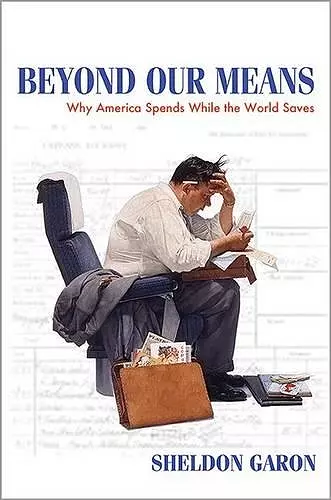Beyond Our Means
Why America Spends While the World Saves
Format:Paperback
Publisher:Princeton University Press
Published:5th Jul '13
Currently unavailable, and unfortunately no date known when it will be back

If the financial crisis has taught us anything, it is that Americans save too little, spend too much, and borrow excessively. What can we learn from East Asian and European countries that have fostered enduring cultures of thrift over the past two centuries? Beyond Our Means tells for the first time how other nations aggressively encouraged their citizens to save by means of special savings institutions and savings campaigns. The U.S. government, meanwhile, promoted mass consumption and reliance on credit, culminating in the global financial meltdown. Many economists believe people save according to universally rational calculations, saving the most in their middle years as they plan for retirement, and saving the least in welfare states. In reality, Europeans save at high rates despite generous welfare programs and aging populations. Americans save little, despite weaker social safety nets and a younger population. Tracing the development of such behaviors across three continents from the nineteenth century to today, this book highlights the role of institutions and moral suasion in shaping habits of saving and spending. It shows how the encouragement of thrift was not a relic of indigenous traditions but a modern movement to confront rising consumption. Around the world, messages to save and spend wisely confronted citizens everywhere - in schools, magazines, and novels. At the same time, in America, businesses and government normalized practices of living beyond one's means. Transnational history at its most compelling, Beyond Our Means reveals why some nations save so much and others so little.
"Garon makes a powerful case that savings isn't about culture. It's policy... You'll think about savings policies differently after [you] pick up a copy of Beyond Our Means."--Christopher Farrell, economics editor of Marketplace Money "Professor Garon offers brilliant scholarship, engaging reading, and some practical insights for dealing with our current financial crisis worldwide. An insightful and provocative book that ... will be a unique and important volume for historians, policymakers, and the general public."--Claude Ury, San Francisco Book Review "How the Anglo-world came to live 'beyond their means ... while the world saves' is the big question of Sheldon Garon's fascinating book. It could not be more timely. Readers who worry that it might be too technical, do not fear. This is a history of flesh and blood, as Garon reclaims the topic from the economists. Facts and figures are surrounded by real people and rich illustrations that convey how passionate societies came to be about saving. Postal saving has never been so sexy."--Frank Trentmann, BBC History Magazine "Garon's policy recommendations could help shift the national trend towards saving more and position Americans towards greater financial health."--Worth "[O]ne of the world's leading authorities on the history of saving."--Joshua Rothman, Boston Globe "[A] fascinating new book... Garon believes the tide can turn, and offers some levelheaded policy suggestions for how America can restore a lasting balance between spending and saving."--Larry Cox, King Features Weekly Service "[A] very important book for critics of capitalism... Garon explains in an ambitious book that roams across centuries and continents ... why much of Europe and Asia embraced, and stuck with, a savings culture while the US first adopted and then abandoned one. It's intriguing social history."--Stephen Matchett, Australian "Garon's story is interesting and informative when focused on the history of small saving and is a recommended read."--Thomas F. Cargill, Pacific Affairs "This book is a model for how historians might re-engage with matters of economy and business using the insights and tools developed during the cultural turn."--American Historical Review "This book is a model for how historians might re-engage with matters of economy and business using the insights and tools developed during the cultural turn."--Kenneth Lipartito, American Historical Review "Garon has provided an account that shows, as with the study of consumption, the limitations of economic understandings of this routine aspect of human behaviour. It is doubtful that there will now be a scholarly turn to savings on a level equal to the outpouring of work on consumer society that has occurred over the last thirty years. But should there be so, then Beyond Our Means would be an excellent place to start."--Matthew Hilton, Social History "Transnational history at its most compelling, Beyond Our Means reveals why some nations save so much and others so little."--World Book Industry "Beyond Our Means is a big book that is very engagingly written, and it deserves a wide general readership. It concerns modern international history in general, though it grows out of work in Japanese history... The kind of constructive reaching out to wider audiences shown in this book is a model for scholars in the various fields of Japan studies."--Mark Metzler, Journal of Japanese Studies "[A] historian of modern Japan, driven by his concerns for America's financial future, has devoted years of research to writing a global history of saving, and he has produced a superb book... [A] timely history book of great contemporary relevance [that] has already embarked on a journey in new directions for public policy and global historical studies."--Elya J. Zhang, Reviews in American History
ISBN: 9780691159584
Dimensions: unknown
Weight: 482g
488 pages